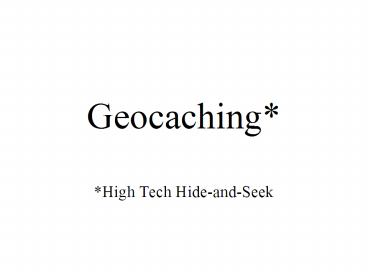Geocaching PowerPoint PPT Presentation
1 / 16
Title: Geocaching
1
Geocaching
- High Tech Hide-and-Seek
2
What is Geocaching?
- Geocaching is a high-tech version of
hide-and-seek. - Geocaching is an entertaining adventure game for
GPS users. - Geocachers seek out hidden treasures utilizing
GPS coordinates posted on the Internet by those
hiding the cache.
3
What is Geocaching? (continued)
- Using a GPS receiver, they then trek out into the
backwoods or urban jungles to find the hiding
spot of the cache. - Once discovered, geocachers follow a simple set
of rules - Fill out the logbook.
- Take something out.
- Put something back in.
- Return the cache to the exact position and
condition in which it was found.
4
What is Geocaching? (continued)
- The word Geocaching broken out is GEO for
geography, and CACHING for the process of hiding
a cache. - A cache in computer terms is information usually
stored in memory to make it faster to retrieve,
but the term is also used in hiking/camping as a
hiding place for concealing and preserving
provisions.
5
What is a GPS device?
- A GPS unit is an electronic device that can
determine your location (within around 6-20 feet)
anywhere on the planet. - Global Positioning Satellite
6
What are the rules in Geocaching?
- Take something from the cache.
- Leave something in the cache.
- Write about it in the logbook.
7
Whats usually in a cache?
- A cache can come in many forms but the first item
should always be the logbook. - In its simplest form a cache can be just a
logbook and nothing else. - The logbook contains information from the founder
of the cache and notes from the cache's visitors.
- The logbook can contain much valuable, rewarding,
and entertaining information. - If you get some information from a logbook you
should give some back. At the very least you can
leave the date and time you visited the cache.
8
Whats usually in a cache?
- Larger caches may consist of a waterproof plastic
bucket placed tastefully within the local
terrain. - The bucket will contain the logbook and any
number of more or less valuable items. - These items turn the cache into a true treasure
hunt. - You never know what the founder or other visitors
of the cache may have left there for you to
enjoy. - Remember, if you take something, its only fair
for you to leave something in return. - Items in a bucket cache could be Maps, books,
software, hardware, CD's, videos, pictures,
money, jewelry, tickets, antiques, tools, games,
etc.
9
Where are caches found?
- The location of a cache can be very entertaining
indeed. As many say, location, location,
location! - The location of a cache demonstrates the
founder's skill and possibly even daring. A cache
located on the side of a rocky cliff accessible
only by rock climbing equipment may be hard to
find. - An underwater cache may only be accessed by
scuba. - Other caches may require long difficult hiking,
orienteering, and special equipment to get to. - Caches may be located in cities both above and
below ground, inside and outside buildings.
10
Where are caches found? (cont.)
- The skillful placement of a small logbook in an
urban environment may be quite challenging to
find even with the accuracy of a GPS. - That little logbook may have a hundred dollar
bill in it or a map to greater treasure. - It could even contain clues or riddles to solve
that may lead to other caches. - Rich people could have fun with their money by
making lucrative caches that could be better than
winning the lottery when you find it.
11
Seeking a cache
12
Seeking a cache (continued)
13
Seeking a cache (continued)
14
Seeking a cache (continued)
15
Seeking a cache (continued)
16
Seeking a cache (continued)

